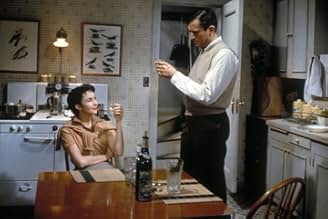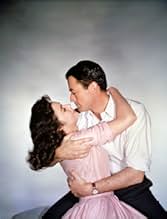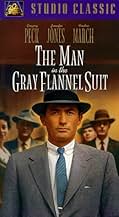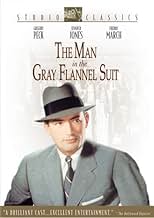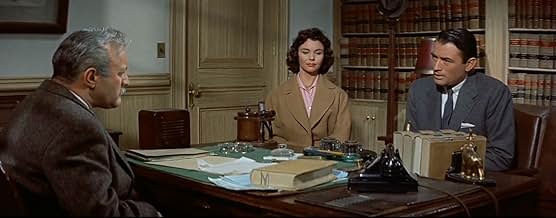VALUTAZIONE IMDb
7,1/10
4331
LA TUA VALUTAZIONE
Aggiungi una trama nella tua linguaAn ex-soldier faces ethical questions as he tries to earn enough to support his wife and children well.An ex-soldier faces ethical questions as he tries to earn enough to support his wife and children well.An ex-soldier faces ethical questions as he tries to earn enough to support his wife and children well.
- Regia
- Sceneggiatura
- Star
- Premi
- 1 vittoria e 3 candidature totali
Tristram Coffin
- Byron Holgate
- (scene tagliate)
William 'Bill' Phillips
- Antonio Bulaga
- (scene tagliate)
Recensioni in evidenza
In Connecticut, the former WWII officer Tom Rath (Gregory Peck) and his wife Betsy (Jennifer Jones) are happily married middle class couple with three children. However, they have financial difficulties and Tom commutes every day to Manhattan to work in a charitable organization receiving a low salary.
Tom is tormented by the traumatic experience in war, where he killed seventeen persons including a young German soldier and he occasionally recalls his love affair with the Italian Maria (Marisa Pavan) in 1945.
When Tom inherits his grandmother's house, her former servant claims the real state but using forged document. Meanwhile Tom is hired to work as public relation of a television network and is assigned to write a speech to the owner, Ralph Hopkins (Frederic March). Soon he needs to decide whether he will be a dedicated executive or 9 to 5 fellows. Further, he learns that he has a son with Maria and she is very needy and he needs to choose between telling the truth to Betsy or keep the secret.
"The Man in the Gray Flannel Suit" is a realistic and humanistic drama about choices of an insecure man with a war trauma that frequently haunts him. Tom Rath sometimes is reluctant, thinking in the safety of his family first, but always takes the right decision supported by his beloved wife Betsy. The story has many subplots and one memorable character, Judge Bernstein, performed by Lee J. Cobb. The story is long but never boring. My vote is seven.
Title (Brazil): "Homem do Terno Cinzento" ("Man in the Gray Suit")
Tom is tormented by the traumatic experience in war, where he killed seventeen persons including a young German soldier and he occasionally recalls his love affair with the Italian Maria (Marisa Pavan) in 1945.
When Tom inherits his grandmother's house, her former servant claims the real state but using forged document. Meanwhile Tom is hired to work as public relation of a television network and is assigned to write a speech to the owner, Ralph Hopkins (Frederic March). Soon he needs to decide whether he will be a dedicated executive or 9 to 5 fellows. Further, he learns that he has a son with Maria and she is very needy and he needs to choose between telling the truth to Betsy or keep the secret.
"The Man in the Gray Flannel Suit" is a realistic and humanistic drama about choices of an insecure man with a war trauma that frequently haunts him. Tom Rath sometimes is reluctant, thinking in the safety of his family first, but always takes the right decision supported by his beloved wife Betsy. The story has many subplots and one memorable character, Judge Bernstein, performed by Lee J. Cobb. The story is long but never boring. My vote is seven.
Title (Brazil): "Homem do Terno Cinzento" ("Man in the Gray Suit")
This movie from the 1950's goes beyond the conflict in balancing home and work commitments because it also deals with the loss of idealism by young people who become caught up with the need to provide and the competition to succeed. Life seems to have gotten worse in the 60 years since this movie was made. In fact, some people, both men and women, have given up on the idea of family life in favour of success in the business world. One can only guess at the level of social dysfunction from our addictive and artificial work environments. In this movie, directed by Nunnally Johnson, a cast of exceptional acting talent provides great entertainment as well as an insight into the shallow lives that many people began to lead in the 1950's. Jennifer Jones signals her dissatisfaction with her husband's work ethic. This at first struck me as a yearning for a lost youth, wanting her husband Gregory Peck to provide for his family while keeping his knight in shining armour image. But Jones is no status seeker; she senses the boring conventional work world that her husband inhabits is not healthy for him or the family. Fredric March, that icon of American integrity, is the company Chairman. On the surface, he pays lip service to family values but struggles with his own estrangement from his wife and a daughter's elopement. Peck learns from March as a mentor but also in his failings as a man. Lee J. Cobb has a supporting role as judge and family friend. Towards the end of the movie, after some setbacks, Peck and Jones take a courageous step together that shows their own integrity and their maturity as a couple. The movie is a another landmark for the World War II generation who came back to civilian life and encountered a new world. It is one worth watching!
I was pleased to get a chance to see this movie -- at least half of it -- during a bout of insomnia. The title was a catchphrase for corporate America for many, many years, a kind of symbol for overachieving, aggressive, ambitious businessmen without principles -- in other words, the "suits."
Though I am generally wary of Gregory Peck's (and Jennifer Jones') tendency to niceness, I was impressed by their work here. Their relationship was both substantial and subtle. Jennifer Jones had much much more humanity and integrity than the average housewife portrayed in other films of the 50s and 60s. Peck's character respected her opinions and values.
But I was knocked out by Fredric March. His type A, workaholic executive was touching on many levels. His utter tiredness, alcoholic puffiness, and innate sadness was plastered over with a Willy Loman-like veneer of gung-ho, jolly-good-fellow false heartiness. How familiar that character was and is -- in real life. His ambition, greed and drive had become a habit, and like any junky, he was simply unable to quit. Despite the human losses. I will never forget the scene in his office, when his wife calls him up, and he slowly hangs up the phone.
A very fine film, with many truths about our national character and obsessions....
Though I am generally wary of Gregory Peck's (and Jennifer Jones') tendency to niceness, I was impressed by their work here. Their relationship was both substantial and subtle. Jennifer Jones had much much more humanity and integrity than the average housewife portrayed in other films of the 50s and 60s. Peck's character respected her opinions and values.
But I was knocked out by Fredric March. His type A, workaholic executive was touching on many levels. His utter tiredness, alcoholic puffiness, and innate sadness was plastered over with a Willy Loman-like veneer of gung-ho, jolly-good-fellow false heartiness. How familiar that character was and is -- in real life. His ambition, greed and drive had become a habit, and like any junky, he was simply unable to quit. Despite the human losses. I will never forget the scene in his office, when his wife calls him up, and he slowly hangs up the phone.
A very fine film, with many truths about our national character and obsessions....
I was really surprised on this film as it was not at all what I expected. The title suggested to me something about life in corporate America, but that was just a background to what was really going on.
The movie was really about men.
I certainly would not excuse the taking of the opportunity to have an illicit affair during wartime, but I can understand the longing for warmth and affection when you are so far away from home and feel that you life is about to end.
I was really taken with the character's (Gregory Peck) cautious approach to life. I can empathize with him as he puts security and safety for his family about the wife's (Jennifer Jones) wanting someone to make a difference. He was never really comfortable stepping out into a world where he did not know the rules.
I can certainly empathize with him in the decision to be a 9-5 man instead of someone who builds. You don't always know the effect that can have on a family when forced to make that decision.
Peck played an honorable man, who tried to do the right thing for his boss and his family. It was a fascinating movie, and I believe that every man cans see some of himself in Peck's character.
A lot of big stars from the era: Fredric March, Lee J. Cobb, and Keenan Wynn made the movie well worth watching.
The movie was really about men.
I certainly would not excuse the taking of the opportunity to have an illicit affair during wartime, but I can understand the longing for warmth and affection when you are so far away from home and feel that you life is about to end.
I was really taken with the character's (Gregory Peck) cautious approach to life. I can empathize with him as he puts security and safety for his family about the wife's (Jennifer Jones) wanting someone to make a difference. He was never really comfortable stepping out into a world where he did not know the rules.
I can certainly empathize with him in the decision to be a 9-5 man instead of someone who builds. You don't always know the effect that can have on a family when forced to make that decision.
Peck played an honorable man, who tried to do the right thing for his boss and his family. It was a fascinating movie, and I believe that every man cans see some of himself in Peck's character.
A lot of big stars from the era: Fredric March, Lee J. Cobb, and Keenan Wynn made the movie well worth watching.
This film reaches far beyond its time. In every way, shape and form; from the troubles to the triumphs of the protaganist, to the intensity and sincerity of its ethos, this cinematic work is an under exposed classic. It is my hope that this film be rediscovered and in doing so help those lost in a sea of moral relativity to detect delineation. The story cleary exposes the moral and emotional importance of honesty and its consequences. Additionally, the issue of war-time trauma is touched upon and its long-term impact on personal and professional relationships.
The performances by all are outstanding and will resonate with the viewer dramatically. As a gen x'r, I found this film to be a breath of fresh air. I am not alone. I pray that this story will be recirculated - for its impact is profound.
The performances by all are outstanding and will resonate with the viewer dramatically. As a gen x'r, I found this film to be a breath of fresh air. I am not alone. I pray that this story will be recirculated - for its impact is profound.
Lo sapevi?
- QuizOne of Gregory Peck's movie children was played by Portland Mason, who was the daughter of actor James Mason, and an Italian delivery boy was played by Johnny Crawford a few years before he would achieve fame on the popular TV Western, The Rifleman (1958).
- BlooperIt is believed by some that Tom shifting his car into reverse then driving away forward at the end of the film is a goof. However, the car is a manual transmission Ford with a column-shifted 3 speed manual transmission with an unsynchronized first gear. A quirk of that style transmission is that at a standing stop, getting the transmission into 1st gear when the engine is running is easiest if the operator first abruptly lifts the shift lever from neutral to place the transmission into second gear, then back down into first. This prevents clash (grinding) of the unsynchronized first gear. Drivers of the era, including Tom Rath, would have been well familiar with this technique.
- Citazioni
Tom Rath: I don't know anything about public relations.
Bill Hawthorne: Who does? You've got a clean shirt and you bathe every day. That's all there is to it.
- Curiosità sui creditiOnce it fades in, the 20th Century Fox logo (set to the film's dramatic opening credits music, rather than the traditional Fox fanfare) appears in a slightly smaller CinemaScope windowbox, slowly panning to normal size (correctly fitting the CinemaScope screen) before fadeout.
- ConnessioniFeatured in The Fifties (1997)
- Colonne sonore(I'm a) Ramblin' Wreck from Georgia Tech
(1908) (uncredited)
Lyrics by Billy Walthall
Music by Frank Roman and Mike Greenblatt
based on "Son of a Gambolier"
Music by Charles Ives (1895)
Played on the ukulele by Gregory Peck
I più visti
Accedi per valutare e creare un elenco di titoli salvati per ottenere consigli personalizzati
- How long is The Man in the Gray Flannel Suit?Powered by Alexa
Dettagli
- Data di uscita
- Paese di origine
- Sito ufficiale
- Lingue
- Celebre anche come
- The Man in the Gray Flannel Suit
- Luoghi delle riprese
- Azienda produttrice
- Vedi altri crediti dell’azienda su IMDbPro
Botteghino
- Budget
- 2.670.000 USD (previsto)
- Tempo di esecuzione2 ore 33 minuti
- Colore
- Proporzioni
- 2.55 : 1
Contribuisci a questa pagina
Suggerisci una modifica o aggiungi i contenuti mancanti

Divario superiore
By what name was L'uomo dal vestito grigio (1956) officially released in India in English?
Rispondi

